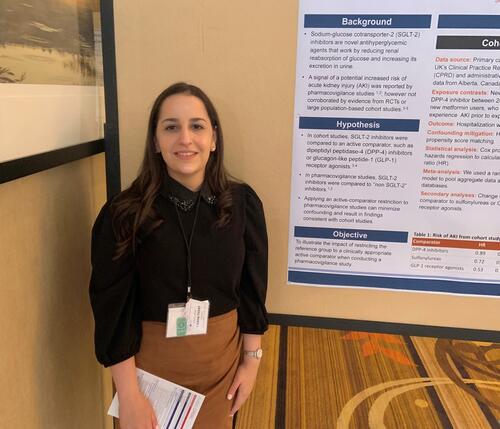
The importance of knowledge translation in health care
Waterloo Pharmacy professor and doctoral student invited to discuss recent research findings in Neurology

Waterloo Pharmacy professor and doctoral student invited to discuss recent research findings in Neurology
By Milana Madzarac School of PharmacyIn an age of misinformation, knowledge translation (KT) is an increasingly important way to communicate research to the audiences who need it.
Knowledge translation links the creation of knowledge from research areas to real-world situations. With increased specialization and the level of disciplinary-specific training required to engage with research findings, KT is a purposeful approach to bridging communication gaps between disciplines and with public audiences.
Dr. Colleen Maxwell, a professor and research chair at the University of Waterloo School of Pharmacy, and doctoral student Wajd Alkabbani were invited by the prestigious journal Neurology to write a KT editorial on a recent research study.

Dr. Colleen Maxwell, professor and research chair at the University of Waterloo School of Pharmacy, co-authored a work of knowledge translation about a recent drug study.
The research piece that Maxwell and Alkabbani were reviewing was investigating whether pioglitazone, an already existing older diabetes medication in the group of thiazolidinedione (TZD) drugs, can protect patients from dementia. The original research piece seemed to report promising results that were consistent with previous research. The original research was conducted by Ha et al.
Neurology, the official journal of the American Academy of Neurology, is the most widely read and highly cited peer-reviewed neurology journal with significant clinical reach. The editorial commentary by Maxwell and Alkabbani is an example of how KT can bring health-care research to wider audiences.
“The study was well conducted and included a lot of nuanced methodology, but we need to take a step back and look at all the existing evidence around the safety profile of pioglitazone,” Alkabbani says. “The research findings by Ha et al are exciting but the overall clinical conclusion can get lost. Editorials are important to ensure knowledge translation is properly conveyed to not over-emphasize results.”

Wajd Alkabbani, a doctoral student at Waterloo's School of Pharmacy, co-authored the knowledge-translation editorial that helped clarify research findings for a broader audience.
Maxwell and Alkabbani’s editorial has been a key factor in public communication about the research findings and cited recently in at least 29 news outlets so far. Utilizing KT to assist with science communication can strengthen the health-care system and improve informed decision-making.
“Despite being a strong study, the investigation by Ha et al did have methodological limitations that need to be more fully addressed to clearly understand the relative benefits versus risks of comparable antidiabetic medications in relation to cognitive and other health outcomes,” Maxwell says.
Pioglitazone, a drug approved by the FDA in 1999 to help improve control over blood sugar levels in type-2 diabetes patients, was viewed as an exciting second-line agent for diabetes treatment and management. However, adverse side effects began to show in patients, such as heart failure, risk of bladder cancer and additional weight gain.
Dr. Colleen Maxwell and Wajd Alkabbani, who is supervised by Dr. J.M. Gamble, wrote the editorial with Dr. Sevil Yasar from Johns Hopkins University, “Pioglitazone and Lower Risk of Dementia: Will This Change Practice?” on the research paper by Ha et al., “Pioglitazone use and reduced risk of dementia in patients with diabetes mellitus with a history of ischemic stroke.”

Read more
Interdisciplinary teamwork invaluable to health-care system

Read more
Waterloo School of Pharmacy co-op student invaluable to industry

Read more
Waterloo School of Pharmacy professor Dr. Nardine Nakhla launches new digital health tool
The University of Waterloo acknowledges that much of our work takes place on the traditional territory of the Neutral, Anishinaabeg, and Haudenosaunee peoples. Our main campus is situated on the Haldimand Tract, the land granted to the Six Nations that includes six miles on each side of the Grand River. Our active work toward reconciliation takes place across our campuses through research, learning, teaching, and community building, and is co-ordinated within the Office of Indigenous Relations.